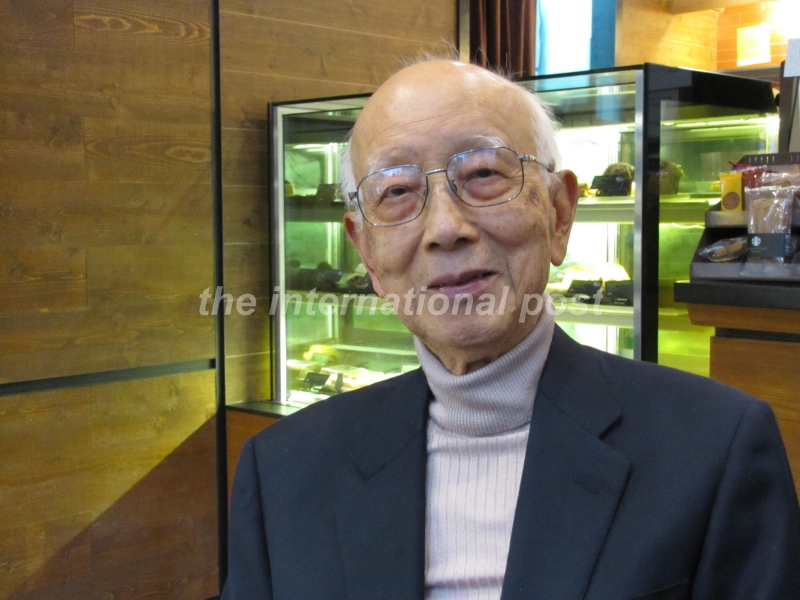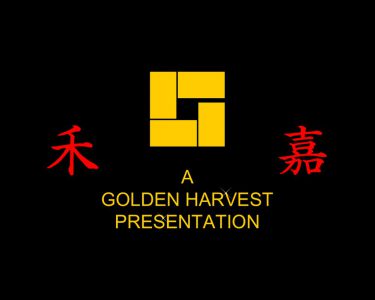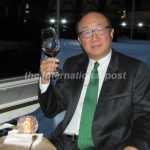Raymond Chow, legendary Hong Kong film producer
Tags: chow-man-wai, cinema, film, golden-harvest, hong-kong, jackie-chan, king-hu, leonard-ho, michael-hui, production, raymond-chow, roberta-chow, run-run-shaw, sammo-hung, shaw-brothers, tsui-hark, wong-fei-hung, 鄒文懐

Golden Harvest is a Hong Kong film production, distribution and exhibition company founded in 1970 by Raymond Chow, Leonard Ho and Leung Fung. Its name in Chinese is 嘉禾娛樂事業集團有限公司.

The company launched the careers of action stars such as Bruce Lee, Jackie Chan, Sammo Hung, Jet Li, director Tsui Hark, and king of comedy Michael Hui.
Raymond Chow started his film career at Shaw Brothers, before founding his own company, Golden Harvest, which supplanted Shaw Brothers in the market by the late 70’s.
We met Mr. Chow, his wife and his daughter Roberta in Hong Kong for an introduction and coffee after he was done playing go for that day, and followed-up with an e-mail interview.
– Stéphane Lam: You have described yourself as a film lover first. Which movies have really struck you in your young years, as far as you remember, Western and Oriental, silent and talkies?
– Raymond Chow: When I was a high school and university student, I watched many movies. Sometimes I would watch two or three in the same day on the weekends. My favorite movies, still to this day, are: Great Waltz (Toute la ville danse, by Julien Duvivier, 1938), Casablanca and Witness for the Prosecution (the Marlene Dietrich version, 1957, by Billy Wilder).
An interesting story about Great Waltz: years ago, in the 1990’s, the then-new Chairman of MGM was visiting the MGM offices all over the world. When he visited Hong Kong, I was invited to meet with him. He asked me what my favorite MGM movie was. I told him, Great Waltz; and it was a pity that it seemed unavailable for sale on video. He looked puzzled and whispered among his staff. Apparently no one had heard of the picture! I told him it was an Oscar winner. Months later, the Chairman sent me a letter to thank me. Apparently, when he went back, he ordered the film vault to be inventoried, and they “unearthed” this classic treasure. He sent me a videotape copy of the movie.
– In which way your practice of kung fu has been influential in your production orientation, and in your daily life, even nowadays?
– I trained in kung fu only as a child, and only for my health. I was a very frail boy, and my father’s friends told him to find someone to teach me some martial arts. My father found the best of the best: martial arts legend Lam Sai Wing (Wong Fei Hung’s student). At the time, he was quite old and already retired, but my father persuaded him to accept me as his last student. I was about six years old, and learned double swords. I don’t think I was any good. Doing this form of exercise and building up my strength helped me become interested and rather skilled in sports, such as soccer, in which I participated in my youth. To this day, my lower body is still quite strong, and my sense of balance quite good, as an indirect result of the kung fu training.
However, as a child I was always interested in reading wu xia (martial arts) novels. In fact, I had the urge to write a wu xia novel. Studying kung fu helped me make the connection between reading about something and actually doing the movement. Making films about that was just a natural extension.
– Did you ever have any producing ambition or inclination before you were proposed to get more involved in production at Shaw Brothers ?
– I had always done creative work. I always liked to write, and wrote essays in addition to my journalistic work. And I tried, in a very preliminary way, to write a wu xia novel. But no, I had never even thought about producing films before Shaw Brothers.
– As a producer, what is your position on art, product, and industry?
– Whatever I can contribute to the film industry, I do not for art, but for love. I have always liked to listen to stories, and to tell stories. To a great extent, I make films to entertain people. The more people watch it, the more successful I am in fulfilling this philosophy. And the measure of success comes from the box office. More tickets means more people are watching my movies. It is an old-fashioned saying but people vote with their wallets. In that sense, it is a business, an industry.
– You have been introduced to Run Run Shaw by your professor, and hired as the head of publicity. Was the position free at the time, or just non-existent yet?
– Non-existent. Run Run Shaw was just starting to build up the company in Hong Kong. He needed people to work for him. I was the third or fourth person he hired.
– What was the first impression Mr. Shaw gave you when you very first met him?
– Very sharp. He knew exactly what he wanted. He was very ambitious in building up a film distribution and later a production center for Asia.
– When you left SB (Shaw Brothers) to launch GH (Golden Harvest), what were the biggest changes and differences you wanted to make, compared to SB?
– Honestly speaking, I never analyzed it as a whole. Often, afterwards, people tend to take a “top shot”, so to speak, of the whole picture and look at it that way. But when you’re living the process, in the real world and in real time, you just think that you should move in a certain general direction that feels right at the time, and learn as you go, and with a little bit of luck we’ll get somewhere.
– Golden Harvest: beyond the undoubtable poetry of the name, how did it come up?
– I was discussing with Leonard Ho and King Hu, etc. about the name of the company. King Hu came up with the Chinese name, “Jia He”, and we all agreed right away. I then came up with the English, Golden Harvest, based on the Chinese name (in meaning).
– What did you learn that was mostly important or impressive during your Hollywood experience at Golden Harvest, in terms of financing, studio organization, cast and crew hiring, and executive production?
– Hollywood had been making films in a systematic way for a lot longer than Hong Kong. When I went to Hollywood in the 1970’s, I was amazed to see there was such a complete system in place for all phases of pre-production, production, post-production and distribution. I also saw that there were certain aspects of it I could pick up and use in Hong Kong, but others that were simply impossible or unsuitable for Hong Kong’s industry.
– In which way HK (Hong Kong) production surpassed Hollywood’s production?
– It’s hard to define “surpass”. Hollywood’s filmmaking history is so much longer than Hong Kong’s. Perhaps because there is not a system in place for everything, I think that Hong Kong filmmakers are more flexible and adaptable to changes. Filmmakers here have a sort of “anything goes” attitude that is very invigorating to me.
– At the time, how were Chinese cast and crew considered in L.A.? Were people there welcoming at all?
– Then as now, Hollywood was ready to take whatever talent from anywhere in the world. We were not treated any differently, since I and the people that I brought can communicate in English. Also, in pragmatic Hollywood, there is what is known as The Golden Rule: “He who holds the gold makes the rules”.
– On a regular day-to-day operation, how was the work shared between you and Leonard Ho?
– In very broad terms, he took care of the internal affairs of the company, and I took care of the external. But Leonard and I discussed and worked on every major decision. Leonard and I had a very unique bond, though, because we thought in very similar ways and often there was no need to speak to know what the other was thinking. It certainly saved a lot of time when we had so many things to take care of.
– Who filled in when Leonard Ho suddenly passed in 1997?
– No one.
– Please tell us more about your daughter Roberta in being involved in GH, and how the thrill of movie production has grabbed her.
– I was hoping she would take over for me in the company, so I had her start from the bottom in film production.
– Mrs. Chow: I always thought you intended for her to work in the office with regular hours. Other woman producers went shopping and played mah-jong and seemed to have it easy. She was at the studio up to 20 hours a day.
– Roberta Chow: You told everyone you did not want me to take over, and in fact did not want me in the film industry at all because it can be a place where very bad things can happen, and you might not always be there to protect me. As I remember, I had a boyfriend in America, so although I wanted to study something else there, you made me take a Masters degree in film and insisted that I come back and work for you. So, as with many things we talked about today, you took one step at a time.
– As a talent digger, who did you think would turn out to be stars no matter what? Among these names, who never reached that status even though they very much deserved it?
– It’s easy to say now: Bruce Lee, Jackie Chan, Sammo Hung, Michael Hui…. I believe that even if I had not been able to work with them, they would become big stars. But even more people had the potential, were able to work hard, we did our best to groom them, but in reality there are many factors at play: whether they have that unknown quality that some people now call the X-factor, as well as luck, etc. That’s the entertainment business: no one knows.
– Could you tell us how film production has meant to you in your life?
– It was a very major part of my life. My company was built on film production, but production also made me realize that I needed to control film distribution to have the complete picture.
– How was this wonderful program of “The Cinematic Matrix of Golden Harvest” at the HK Film Archive in 2013 put together, and what was the original emphasis you and the programmers had in mind?
– I must thank the Hong Kong Film Archive for that great honor. I actually had nothing to do with the program besides loaning them some photographs and doing one interview. I just showed up when they told me to, for the grand opening.
– How would you like this program to be also picked up in other countries, such as the USA and France?
And how can we get you involved to have the most prominent retrospectives just as Golden Harvest deserves?
It would be best if this program can travel overseas. That way, more people can know about the Hong Kong film industry.
Raymond Chow, a.k.a. Chow Man-Wai, a.k.a. 鄒文懐, retired in 2007. He lives and was born in Hong Kong (1927).
Special thanks: Roberta Chow and Sam Ho.


